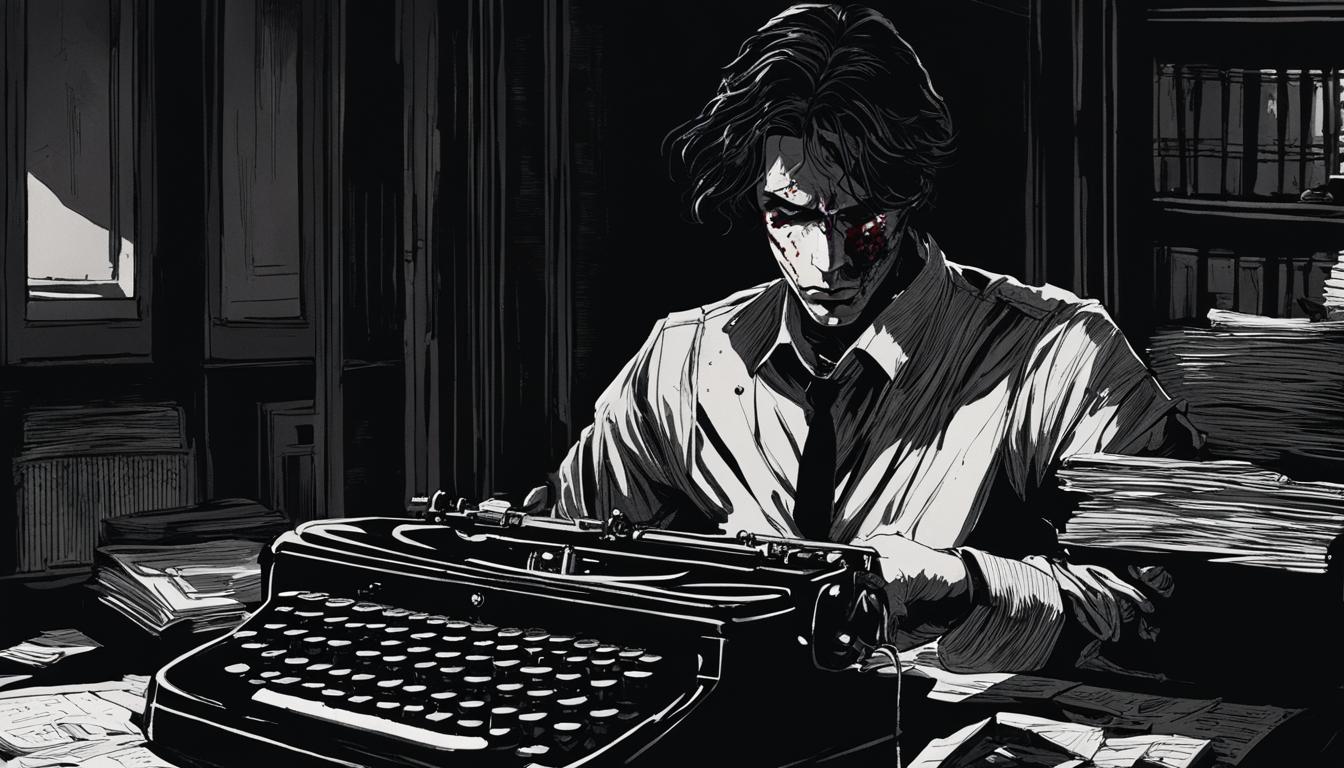In the annals of literature, few names ignite as much intrigue and controversy as Stephen King. Yet, there’s another moniker that provokes a similar response among his ardent readers—Richard Bachman. This pseudonymous alter ego has shaped a subtle subset of King’s esteemed bibliography, with “Rage” standing as its most controversial novel. The story behind King’s choice to publish under an assumed name, and the tempest that ensued, is a fascinating tour of literary identity.
Understanding the visceral and sometimes unsettling intensity that “Rage” encapsulates demands a view into the calculated, deliberate framework King used in crafting his narratives, irrespective of the name on the cover. Bachman’s existence is a testament to an author’s need for an undisturbed canvas, a chance to paint with unconstrained strokes away from the piercing spotlight that King’s fame hoisted upon him.
Throughout this exploratory journey, the dialogue between King and Bachman’s identities will be brought to light—their confluence and divergence enriching the textured landscape of their collective oeuvre. As we delve into the enigmatic puzzle that binds Stephen King to Richard Bachman, we set the stage to unravel the legacy of “Rage,” a novel saturated with raw exploration and an indelible imprint on cultural consciousness.
Unveiling Richard Bachman: King’s Alter Ego
The exploration into the enigmatic persona of Richard Bachman unveils a fascinating backstory speckled with the nuances of Stephen King’s writing style and the conscious choice to adopt a literary alter ego. Richard Bachman’s significance in King’s career not only highlights the pseudonym origins but also delineates the psychological interplay between an author and his shadowy counterpart.
Origins of the Bachman Pseudonym
The inception of Richard Bachman stemmed from a combination of practicality and a creative experiment. Due to publishing industry standards at the time that suggested an author should not release more than one book a year, King adopted the pseudonym to publish additional works. This move also provided him with a platform to explore different genres and writing styles with unabashed freedom, contributing to his vast and diverse body of work.
The Significance Behind the Name
The selection of ‘Richard Bachman’ was both strategic and symbolic. The first name was plucked as a tribute to crime author Donald E. Westlake’s pseudonym, Richard Stark. ‘Bachman’ was reportedly influenced by a piece of music King was listening to at the time—by Bachman-Turner Overdrive—a reflection of the spontaneity and eclectic inspirations feeding King’s creative process.
Connecting King and Bachman’s Literary Styles
While King’s and Bachman’s writing are branches from the same tree, they do exhibit distinct characteristics. Bachman’s narrative voice often resonated with a darker, more cynical tone and hosted scenarios with a heightened sense of psychological realism—traits that King occasionally blended into his acclaimed horror fiction. At times linear and disciplined compared to King’s typically elaborate and supernatural plots, Bachman’s works are key to understanding King’s literary dexterity.
A comparative overview of the styles, themes, and receptions of King versus Bachman further illuminates their interconnected legacies:
| Aspect | Stephen King | Richard Bachman |
|---|---|---|
| Writing Style | Elaborate, Supernatural, Expansive | Direct, Cynical, Realistic |
| Common Themes | Good vs. Evil, Redemption, Survival | Societal Flaws, Individualism, Desperation |
| Initial Reception | Critically-Acclaimed, Bestsellers | Moderate Sales, Cult Following |
The dichotomy between Stephen King and his pseudonym paints a rich tapestry of literary exploration, arguably contributing to the compendium of classic works that continue to shape the horror genre and modern literature at large.
The Dichotomy of Fame and Anonymity
At the zenith of his career, the name Stephen King became synonymous with masterful storytelling, each novel releasing to the frenzied anticipation of fans worldwide. However, beneath the gleam of Stephen King fame, there was a compelling yearning for anonymity—a paradox that would lead to one of the most fascinating episodes in modern literature: the advent of Richard Bachman. The celebrity author, weary of the limelight and the weight of expectations, sought refuge under the cloak of Bachman’s secrecy.
This strategic shift to a pseudonym was not just a whimsical maneuver from an author with the luxury of fame but a calculated move to experiment with creative freedom untethered from the Stephen King brand. Bachman’s works emerged from the shadow, devoid of the preconceptions that trailed King’s byline. In many ways, the adoption of Richard Bachman presented an unmarked literary canvas, a place for King to explore the raw grit of his narrative capabilities without the critical lens fixated on his every word.
The question that presents itself is: How does anonymity impact an already established author? For King, the answer lay in the spectrum of responses to Bachman’s work. Without the fanfare of King’s name, these novels were received with a fresh set of eyes, offering a rare perspective on the work’s inherent value and the freedom to navigate different genres and themes with unspoken audacity.
- Freedom from Expectation: Bachman’s anonymity allowed King to write without the baggage of ‘Stephen King fame’ and explore narratives that may have otherwise been met with skepticism.
- Creative Exploration: As Bachman, King delved into themes and styles distinct from his well-known horror repertoire, displaying the versatility of his literary skill set.
- Critical Insight: The reception of Bachman’s novels provided a raw insight into the merit of the work, unaccompanied by the aura of fame—a valuable lens for any writer.
Ultimately, the experiment of anonymity ended when Bachman was unveiled as Stephen King, but the exercise in literary duality had already underscored the complex interplay between notoriety and the purest form of authorial expression.
Publishing Under Pressure: Bachman vs. King
In the high-stakes realm of literary publishing, few narratives are as fascinating as the dual career of Stephen King and his alter ego Richard Bachman. Navigating through the complexities of authorial identity, commercial expectations, and critical reception, King’s experiment in publishing underscores the unique pressures faced by well-established authors.

A Tale of Two Authors: The Publication Process
While Stephen King’s name was often synonymous with bestsellers, Richard Bachman’s emergence on the scene painted a vastly different picture. Bachman gave King the cloak of anonymity allowing him to publish without the burden of a blockbuster reputation. This facet of authorial identity was instrumental in exploring new literary territories without the accompanying publishing pressure.
Commercial Success and Critical Acclaim
The reception of Bachman’s books was a study in contrasts when held against King’s own work. King’s novels, lauded for their compelling storytelling, grappled with an expectation of success Bachman never bore. Bachman’s novels, essentially devoid of King’s star power, often earned a more measured critique, throwing light on the impact of a name on critical reception.
Sales Figures: Bachman’s Books vs. King’s Novels
| Bachman Book | Publication Year | Sales (Before Revelation) | Sales (After Revelation) |
|---|---|---|---|
| Rage | 1977 | Estimated 10,000 | N/A |
| The Long Walk | 1979 | Estimated 15,000 | Significant Increase |
| Roadwork | 1981 | Estimated 7,500 | Significant Increase |
| The Running Man | 1982 | Estimated 18,000 | Significant Increase |
| Thinner | 1984 | Estimated 28,000 | Explosive Growth |
The direct comparison of sales figures for Bachman’s books and King’s novels spotlights the tangible influences of authorial prestige. Initially, Bachman’s sales were modest, particularly before the disclosure of the true identity of the author. Post-revelation, the numbers reveal a striking upsurge, drawing a direct correlation between critical reception and commercial success when the name ‘Stephen King’ entered the conversation.
The Rage: A Novel Ahead of Its Time
When Stephen King released “The Rage” under the pseudonym Richard Bachman, it arrived on shelves as a disturbing account of school violence and student radicalization. Its narrative on the dark undercurrents of adolescent angst positioned it as a piece of controversial literature. Moreover, the novel’s astonishing foresight, capturing scenarios that society would only later confront with trepidation, marked it as ahead of its time.
Despite its initial mixed reception, “The Rage” soon became a topic of intense debate as it inadvertently mirrored real-world instances of school violence. Critics and readers alike were polarized, with some celebrating King for his unflinching depiction of reality and others condemning the raw portrayal of teenage rebellion turned violent.
Throughout the narrative, the cultural impact of the novel became increasingly apparent. For educational institutions, it spurred a much-needed discussion on prevention and awareness. In the literary community, it raised questions about the responsibility of authors when their fiction intersects so closely with potential real-life scenarios.
| Theme | Implications | Cultural Relevance |
|---|---|---|
| Adolescent Rebellion | Understanding of youth psychology and triggers for violence | Highlighted in discussions post-real-life tragic events |
| Psychological Turmoil | Insight into mental health issues among teens | Mental health advocacy and the importance of counseling services |
| Impact of Literature on Society | Examination of authorial intent and social responsibility | Debates on censorship and the role of fiction in societal change |
“The Rage” remains a seminal work that challenges readers to confront and consider issues that, decades later, continue to resonate. Its unsettling prophecy and powerful narrative are proof of Stephen King’s ability to craft literature not just of his time but for the future, encapsulating fears and social issues that would only gain prominence years after its release.
Deciphering the Themes in The Rage
Stephen King’s “The Rage,” written under his pseudonym Richard Bachman, delves into a chilling narrative that dissects themes of violence, psychological turmoil, and societal issues. Its exploration of teenage isolation and the psyche of a school shooter continues to offer a profound social commentary on issues that remain pertinent to this day.
Exploring the Psyche of a School Shooter
The psychological analysis in “The Rage” provides a window into the disturbed mind of a teenager who resorts to violence as a form of expression and control. By thoroughly examining the protagonist’s background and mental state, the book presents readers with a complex understanding of the motives and triggers that lead to such a drastic action.
Social Commentary: Bullying and Responsibility
King’s piercing social commentary in “The Rage” transcends the novel’s timeframe, reflecting on bullying and responsibility within the school system. The narrative challenges readers to question the societal structures that contribute to alienation and aggression among youth as it underscores the long-term impacts of harassment and adult neglect on teenage well-being.
The Impact of Isolation on Teenagers
One of the novel’s central themes is teenage isolation—a state that not only affects the individual’s social development but also has the potential to ignite a series of devastating events. “The Rage” thoughtfully presents isolation not simply as a phase, but as a signal urging for empathetic intervention and understanding, shining a light on an issue that continues to manifest in schools worldwide.
The Controversial Fate of The Rage
Stephen King’s decision to let “The Rage” fall into the shadows of out-of-print status remains a pivotal moment in literary history, raising questions about book controversy and the responsibility carried by creators. This controversial shift by King evoked a spectrum of public reaction and led to a widespread discussion about artistic responsibility.
King’s Decision to Let The Rage Go Out of Print
In an unprecedented out of print decision, Stephen King took a stand against his own creation in response to its unintended association with societal issues. The ethical responsibilities of an author came into sharp focus, with King’s choice transcending commercial interests and speaking to a deeper sense of moral accountability.

Public Reaction and Media Scrutiny
The book’s retreat from publication was met with a storm of media scrutiny. While some applauded King for his principled stance, others saw it as a form of censorship, inadvertently raising the novel’s mystique and further propelling the book controversy. This table reflects the diverse range of responses:
| Stakeholder | Response | Impact on Perception |
|---|---|---|
| Literary Scholars | Debate on literary merit versus societal impact | Enhanced academic discourse |
| Censorship Opponents | Concerns over freedom of expression | Increased advocacy for unbridled publication rights |
| Readers | Mixed feelings of understanding and disappointment | Amplified curiosity and candid discussions |
| Media Outlets | Intense scrutiny and widespread coverage | Augmented public interest and awareness |
The Ethical Dilemma of Artistic Responsibility
The juxtaposition of an author’s liberty to create and their duty to consider the broader implications of their work forged a complex debate around artistic responsibility. This led to introspection within the creative community about their roles and the unseen ripples their works could create in society.
Bachman’s Influence on King’s Broader Work
The literary influence of Richard Bachman on Stephen King’s bibliography is an intricate tapestry of thematic elements and stylistic evolution. Writing under the pseudonym allowed King to explore different facets of narrative voice and subject matter, enriching his craft and contributing to a diverse literary identity. Through examining Bachman’s legacy, we can uncover how these forays impacted the subsequent writing evolution of one of the most prolific authors in contemporary fiction.
What began as an experiment to circumvent market saturation under his real name, Bachman became an integral part of King’s creative process. Infusing King’s bibliography with fresh themes and an unrestricted approach to narrative structure, Bachman’s works often touched darker, more cerebral tones. The psychological intensity and moral quandaries within these books resonated with King’s audience and foreshadowed future explorations in his mainline novels.
The influence of Bachman is evident when reviewing the cross-pollination of themes between the two personas. King, acknowledged for his profound character studies and unease-inducing plots, owes much to his stint as Bachman. The alter-ego’s impact is not merely in thematic parallelism but in King’s matured propensity for nuanced storylines and complex characters which owes much to Bachman’s formative ventures.
- Evolution of psychological depth in character development
- Increased interplay of moral gray areas and ambiguity
- Experimentation with narrative structure influencing King’s later works
- Bachman’s exploration of societal issues setting a foundation for King’s potent social commentary
The ever-growing King’s bibliography is a testament to his adaptability and continuous development as a writer. Bachman’s legacy is an essential chapter in that progress—a mirror showing the multiplicity of King’s literary persona and the breadth of his storytelling capabilities. It is a symbiosis where Bachman informed King’s evolution, while King’s expanding skillset gave new dimensions to Bachman’s fictive narrative, forging a combined legacy greater than the sum of its parts.
Stephen King Richard Bachman Rage: The Exploration of Inner Demons
Exploring the depths of human psychology, Stephen King, under the pseudonym Richard Bachman, unravels themes of psychological horror in “The Rage,” compelling readers to confront their inner demons. Through a pseudonymous lens, King probes into the darkest facets of the human spirit, challenging the narrative boundaries of pseudonym psychology and tapping into the collective unconscious of his audience.
Horror as a Mirror to the Human Condition
The mere act of storytelling under an alias like Richard Bachman has allowed King to explore the more sinister aspects of our reality without restraint. The genre of psychological horror becomes a reflection, a stark and unflinching mirror held up to expose the complexities and frailties inherent in all of us. It is here that readers find themselves face-to-face with their deepest fears and unacknowledged desires.
The Psychology of Pseudonyms in Literary Works
The usage of a pseudonym can offer a writer the freedom to navigate through various narrative landscapes with newfound anonymity. King’s adoption of Bachman goes beyond a mere pen name—it acts as a conduit for exploring the psychology of his characters and himself. The decision to divide his work between two names speaks volumes about the function of pseudonyms in the literary world, allowing writers to dissect the layers of their creativity and personal truths.
The Collective Unconscious of King’s Readers
King’s ability to tap into the collective unconscious is evidenced by the resonance of his work with readers across the globe. Characters and storylines may be fictional, but the fears they embody are universally understood and felt. Whether through Stephen King or Richard Bachman, the exploration of these themes bridges the gap between individual experience and shared human connection. “The Rage” stands as a testament to this intricate tapestry of collective psyche.
Conclusion
In delving into the depths of Stephen King’s literary pursuits, we have uncovered the multifaceted persona of Richard Bachman and the provocative narrative of “The Rage.” This exploration not only reveals the intricate relationship between an author and his alter ego but also sheds light on the broader societal issues embodied within their works. The journey through King’s legacy and the impact of Bachman has affirmed the significance of embracing even the most unsettling themes in literature.
The psychological landscape that King, through Bachman, traverses in “The Rage” exemplifies the enduring themes that are woven into the fabric of King’s extensive bibliography. This literary analysis has provided a lens through which we view the formidable influence of an author’s choice to write under a pseudonym. Bachman’s impact, distinct yet inextricable from King’s legacy, is an indelible imprint on the field of psychological horror and the literary world at large.
In retrospective contemplation, King’s willingness to confront unnerving subject matter challenges readers to engage with uncomfortable truths. Encapsulating the essence of psychological complexity and the darkness that resides within human nature, the works of Stephen King, under both his name and that of Richard Bachman, continue to resonate with audiences. They cast a long shadow that instigates profound reflections on our collective experience, underscoring the power and responsibility inherent in storytelling.



